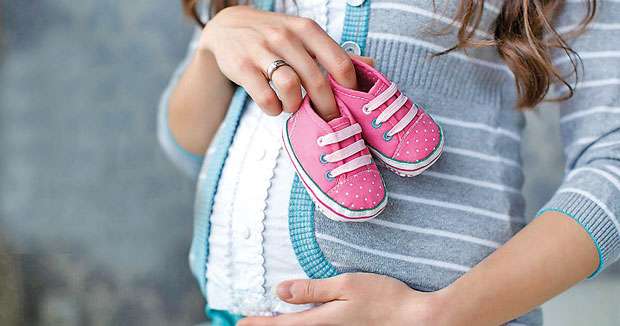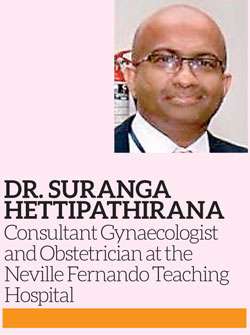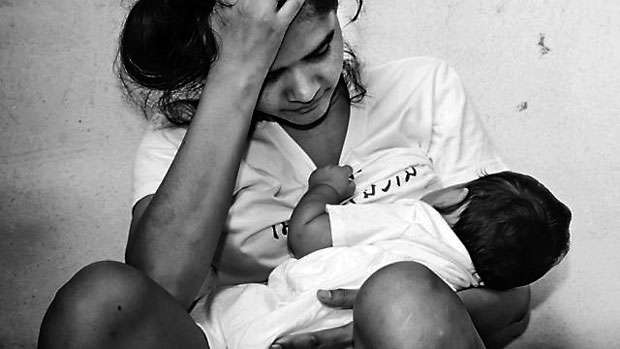07 Dec 2018 - {{hitsCtrl.values.hits}}

 Theoretically, a girl reaching her menarche (attainment) gives a green light for her to keep one step ahead in the journey of life with the capability to give birth to offspring. Sri Lankan girls usually attain menarche around the age of 12. Does this really mean that they are fully grown up and meet the ultimate physical and psychological requirements to reach this important milestone of life-motherhood?
Theoretically, a girl reaching her menarche (attainment) gives a green light for her to keep one step ahead in the journey of life with the capability to give birth to offspring. Sri Lankan girls usually attain menarche around the age of 12. Does this really mean that they are fully grown up and meet the ultimate physical and psychological requirements to reach this important milestone of life-motherhood?
On today’s Health Capsule, we are going to shed light on Teenage pregnancy. This is one of the most important issues we get to see in our Gyaenocology and Obstetric wards, probably due to lack of awareness superimposed by amateurish practices and unacceptable social norms.
According to Dr. Suranga Hettipathirana, Consultant Gyaecologist and Obstetrician at Neville Fernando Teaching Hospital (NFTH), teenage pregnancy is a global phenomenon and is described as a pregnancy occurring in a young woman who has not reached her 20th birthday. This definition, more importantly is applicable irrespective of the legal status of the marriage of the woman or legal age to consider an individual as an adult (A couple whose marriage is registered by the Registrar of marriage is considered as a legal marriage).
The pregnancy rate among teenagers in USA was 67.8 pregnancies per 1,000 women aged 15–19 in 2008 and among the countries in the Western Europe, the United Kingdom (UK) has the highest teenage conception and abortion rates. The rate of conception rate among those under 18 years in the UK was 40.5 per 1000 in 2008. This is five times higher than the rate in Netherlands, more than twice the rate in Germany and twice the rate in France. As far as South Asian countries are concerned, Bangladesh, Nepal and India own a teenage pregnancy rate of 35%, 21% and 21%, respectively. However, the teenage pregnancy rate in Sri Lanka is much lower than the rates noted in the rest of South Asian countries. Reproductive health information database of Family Health Bureau of the Ministry of Health, Sri Lanka, indicates that 6.5% of the total pregnancies registered during the year 2010 were teenage pregnancies and in addition to that the Demographic and Health Survey, Sri Lanka, 2006/07 revealed that 6.4% of women had begun childbearing when they were teens.
A full -term pregnancy lasts about 40 weeks and a baby that is delivered before 37 weeks is a premature baby (preemie)
Also facts reveal that the  prevalence is significantly higher in rural areas, estate sectors of Sri Lanka and areas affected by the war that concluded. According to the UNFPA fact sheet ensuring Women’s Health, the highest incidence of teenage pregnancy has been recorded in Trincomalee, Batticaloa and Mullativu districts and lowest rates in Matale and Colombo.
prevalence is significantly higher in rural areas, estate sectors of Sri Lanka and areas affected by the war that concluded. According to the UNFPA fact sheet ensuring Women’s Health, the highest incidence of teenage pregnancy has been recorded in Trincomalee, Batticaloa and Mullativu districts and lowest rates in Matale and Colombo.
“Although, there aren’t any recent studies done, pertaining to this topic, the rate has definitely risen as a result of various socio-economic factors including-low socio-economic status, low educational background, disrupted family structure, having older sexually active siblings or pregnant/parenting teenage sisters, a victim of sexual abuse, poor sexual health practices and lack of knowledge about contraception (birth control), poor parent/child closeness and poor parental supervision or regulation of children’s activities, bringing about a range of lamentable aftermaths” Dr Hettipatirana highlights.
According to him, this is more of a vicious cycle where children of those affected teenage mothers have a higher tendency to maintain the same life patterns, normalising unacceptable social practices, ending up becoming teenage mothers.
Are you pregnant?
Missing one or more menstrual periods with bodily changes is the classic sign of pregnancy. But this can be quite tricky for teenage girls, whose periods aren’t yet regular. It can also be vague for girls whose cycles are off due to uncurbed dieting and exercise, low body fat from sports or anorexia.
“It is like a baby giving birth to another baby because during the teenage life, neither your body nor your mind is completely ready to accept the poundage of carrying another life inside you” says Dr. Hettipathirana.
“In fact, this can create much trouble not only to the teenage mother, but also for the baby” he added.

Sequels on health cannot be brushed aside
nHigh blood pressure-Pregnant teens have a higher risk of getting high blood pressure -- called pregnancy-induced hypertension compared those in their 20s or 30s. They also have a higher risk of preeclampsia which is a dangerous medical condition that combines high blood pressure with excess protein in the urine, swelling of a mother’s hands and face and organ damage.
nSexually transmitted diseases-Teens who have unsafe sexual intercourse during pregnancy, are vulnerable to get STDs such as chlamydia and HIV which can potentially infect the uterus and growing baby.
A full-term pregnancy lasts about 40 weeks and a baby that is delivered before 37 weeks is a premature baby (preemie). These babies are vulnerable to have various complications such as poor lung maturity, intra-ventricular haemorrhage (bleeding in the brain), poor breathing and heart functioning (PDA), inability to maintain body heat, immature gastrointestinal system, retinopathy of prematurity (potentially blinding eye disorder), Necrotizing enterocolitis (poor blood supply to bowel resulting in the infection of bowel wall), sepsis (infection in the blood stream) and many more which can even be fatal.
Effects on mental health
Once the baby is born, these under-age mothers might not be willing to cater to their child with the due attention, needed. This can often lead to anxiety and annoyance, possibly with the inability to support the healthy growth of a baby.
Financial burden and single parenthood
The burden doesn’t stop here! Once the baby is born, his growth and development can further get affected over a period of time which can possibly result in delayed intellectual and motor development with or without behavioural issues. Therefore ongoing medical care and follow-up is crucial to prevent these complications not only to facilitate a normal pregnancy but also to maintain the mother’s well-being. This is where the role of MOH becomes important and rather than isolating the affected mothers- traumatising them more with the social blame-games and criticism, a satisfactory quality of life should be ensured thus encouraging and spreading awareness among the society to get away from
similar circumstances.
“As medical professionals, things we can do are very limited and it is the responsibility of the entire society to be open on this issue and spread awareness, without considering it as a mere anathema”
On a concluding thought, Dr. Hettipathirana underscored the importance of having open conversations about the sexual aspect of life, contraception and safe sexual practices in the family setting, strengthening and expansion of social support services, educational programmes at school-targeting early adolescents in order to empower self-integrity in making wise decisions and the augmentation of advocacy to ensure increased awareness and sensibility among girls, their families and communities on the negative consequences of teenage pregnancy not only on sexual and reproductive health but also the overall quality of life of the girl herself, baby and the entire family.
22 Dec 2024 1 hours ago
22 Dec 2024 1 hours ago
22 Dec 2024 2 hours ago
22 Dec 2024 6 hours ago
22 Dec 2024 8 hours ago